
Machine Learning: Everything you Need to Know
Everyone is talking about how robots will take our jobs, our factories, our machines and eventually, rule over us. It is scary to imagine a future where you are at the mercy of machines.
But it doesn’t have to be this way. Machine Learning development is that branch of modern technology, which, when utilized properly, can turn this nightmare into your biggest advantage. Imagine a future where you dictate machines and they complete all your complex tasks – including doing your laundry.
What exactly is Machine Learning? (No really, what is it?)
Before we dive into Machine Learning programs, it is essential to understand that Machine Learning and artificial intelligence are NOT THE SAME.
Artificial Intelligence is a technology which involves computers that imitate human behaviour and intellect. These computers are built using MACHINE LEARNING.
If you are even a little bit familiar with it, you may ask “so what is deep learning?”.
Just to clarify, here’s the difference:-
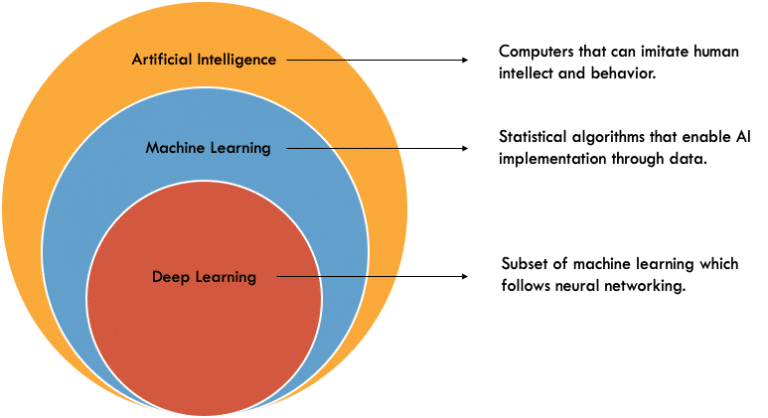
Artificial Intelligence involves complex machines which have the characteristics of human intelligence. They have developed intellectual capabilities and think just like humans. AI machines can make decisions on their own and perform specific tasks even better than humans.
Machine Learning is an approach to building Artificial Intelligence based machines. Machine Learning utilizes algorithms, parses data, and learns from it to make predictions about something. Machines are trained using large datasets and they learn how to deliver future output from that data.
Deep Learning takes things a little further. It is an algorithmic approach to implement Machine Learning through neural networks and natural language processing. Through this, machines can form connections and directions between data to deliver the perfect output.
Machine Learning Services: Accurate, lesser-known definition
Machine Learning is the process of training machines to learn through data and deliver predictions. What does this process involve? Algorithms.
Machine Learning is NOT an algorithm. Machine Learning experts write an algorithm to create a model which is continuously provided new data to learn and train itself. As the process goes on, the model provides accurate predictions based on the input data fed to the algorithm.
Here’s an example of Machine Learning Development:-
If you create a Machine Learning model to determine whether the vegetable in a photo is a cauliflower or ladyfinger, you need to continuously provide pictures of both the vegetables to the algorithm based on the set parameters. Once done enough times, the model will accurately determine which vegetable is in the photo.
This is a form of supervised learning, which we will look at later in this article.
Machine Learning is an approach to building artificial intelligence-based machines. It utilizes algorithms, feeding data, and learning to enable a machine to make predictions about real-world scenarios.
Machines are trained using large datasets, and they learn how to deliver future output from that data.
Interestingly, you can feed zettabytes of data to a Machine Learning algorithm to learn from. It will enable the model to learn the relationship between the data and deliver valuable predictions.
Also Read: What is Machine learning? How It Works and Why It Matters
Machine Learning Importance: Why is everyone Talking about it?
Hey, Machine Learning is not new! However, it’s just recently gained stardom.
Don’t believe us? Alan Turing, built enigma, an AI-based machine in WORLD WAR II to determine the location of enemies!
Machine Learning’s importance has become really prominent in over a decade or so. While some attribute the reason as “to build a better future”, some say it is “to make life more convenient”.
Machine Learning solutions deliver results in favour of both.
- Machine Learning experts say that it is essential for individuals and enterprises to start exploring Machine Learning services if they want to make better use of their data.
- If you want more convenience, like machines delivering your food, doing the dishes, washing your clothes, then Machine Learning development is the best way to go.
- Whether its convenience in talking to a customer support representative, understanding our health in real-time or forecasting sales in the next quarter, Machine Learning algorithms will deliver that convenience.
- You are more likely to do a voice search than ever before. And guess what’s behind voice search – Machine Learning model that trains from your search result and voice.
- Your enterprise needs to make accurate decisions from data. Machine Learning solutions help to analyze data, recognize patterns, and remove the manual task of going through massive volumes of customer data.
- As enterprises move closer to a more customer-centric approach, Machine Learning plays a major role in making use of data. Companies like Google, Netflix, Apple, etc., understand the importance of such algorithms and are consistently adding ML algorithms for getting closer to their customers.
Interestingly, if you do a Google search for “buy Nike shoes online” and start seeing Nike shoe ads everywhere, it is because of the combination of tracking cookies and Machine Learning programs.
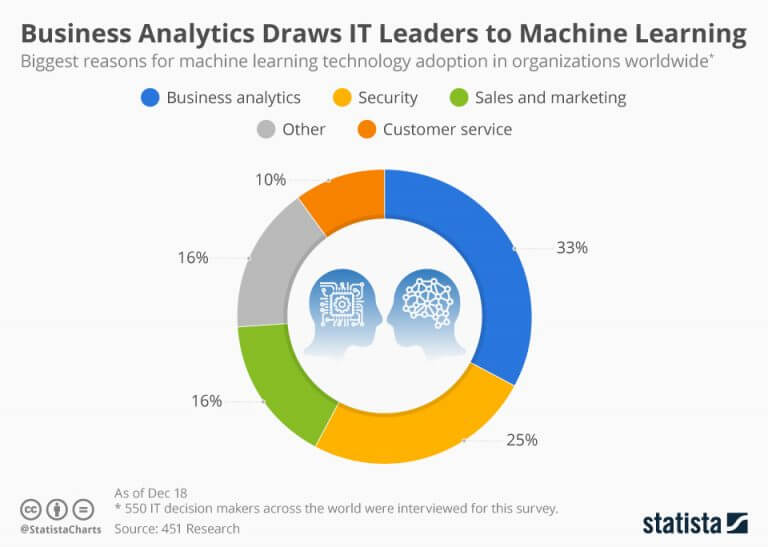
Benefits of Machine Learning: For Individuals
On a personal level, you might ask “hey, how would Machine Learning benefit me?”. Correct, why should you even care about it!
But you should know that the TV shows and movies recommendations that Netflix shows to you on its front page are nothing but a result of Machine Learning solutions.
If you can receive a response within 2 seconds from an Amazon Chat Representative, it is because there is a Machine Learning chatbot installed on their system.
Apple’s Siri is a prime example of Machine Learning programs serving your personal needs through voice assistants and search.
If that’s not enough, when you buy a product online, the related products are a result of the Machine Learning programs placed nicely on the website.
Here’s the last one – how’s surge pricing decided on Uber and other taxi-hailing apps? It’s all a result of effective Machine Learning solutions.
In our day-to-day life, there are numerous advantages of Machine Learning. It is making our life easier, bringing service closer to us, and impacting us in ways we can’t even imagine.
As individuals, we dream of Machine Learning programs and applications which can provide Tony Stark’s Jarvis-like experience at our homes. But that’s a little far away from the future – closer if enterprises understand how much you need it!
Machine Learning Benefits For Enterprises
The big question here lies for the actual users of Machine Learning services, the enterprises asking “What are the benefits of Machine Learning for us?”
Don’t worry about reaping the benefits of early Machine Learning adoption – you are still not behind. Implementing Machine Learning algorithms is still in its infancy, and you have more opportunities than ever to take advantage of them.
There are a plethora of Machine Learning benefits for your organization, whichever industry you are in. Machine Learning solutions aren’t just limited to the IT industry- they provide advantages to manufacturing, automobile, healthcare, finance, and even the entertainment industry (probably the most right now, see Netflix).
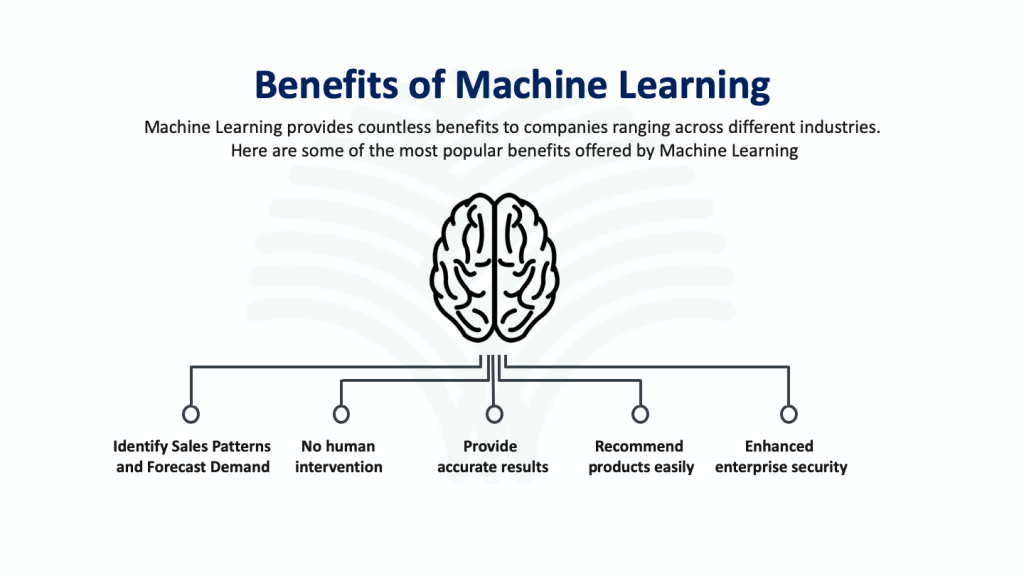
Here are TOP FIVE Machine Learning advantages for your enterprise:-
1. Identify Sales Patterns and Forecast Demand
One of the primary advantages of Machine Learning solutions is that it can help your enterprise to identify the sales pattern and make accurate predictions for future demand.
How? The algorithms take in massive amounts of data from various sources, including your annual reports if you want. You can input this data, and the model will analyze all of it to help you identify a pattern in sales.
It would be of great help if you could predict how much demand you would have for your products in the future. Machine Learning models help you do exactly that.
The algorithms will analyze the past data and deliver you the results by processing a huge amount of data in minutes or even seconds. By analyzing this data, the Machine Learning algorithm will predict customer behaviour and deliver accurate numbers of future sales.
2. No human intervention
How many times have you felt in your organization that you could be doing something more productive instead of supervising a machine for data analytics?
Machine Learning programs make that dream come true. The algorithm is self-serving and does not require any human intervention at all. You just have to feed the data, and the Machine Learning solutions will do their work.
Since they train and learn themselves, you don’t have to supervise the entire process. You can just input data and take away the output for future decision making.
Machine Learning models are really good at identifying SPAM and cyber threats based on a few parameters. Your enterprise could really benefit from machine learning if you want employees to focus on more important tasks.
3. Provide accurate results
There are countless advantages to using Machine Learning in finance. Financial models and data require a lot of manual analysis to make predictions and achieve outcomes.
In portfolio management, investment banking, or algorithmic trading, Machine Learning plays a major role. It is also an excellent technology for fraud detection in the financial sector.
Machine Learning models reduce the risk of human errors and provide near accurate results. Since it continuously processes data, Machine Learning development can identify the anomalies and eliminate them to match the desired outcome.
By implementing Machine Learning algorithms, you can get precision in data management and reach almost accurate results.
4. Recommend products easily
One of the significant benefits of Machine Learning is that you can build a recommendation engine for your enterprise’s online offerings.
If you have an online store, an on-demand streaming website, a FinTech application or a Healthcare platform, recommendation engines are the best things you could implement to enhance the customer experience.
Machine Learning solutions allow you to build models which can help you to recommend products, suggest related products, or show frequently bought together products.
It can help you to recommend the right eating habits based on schedule inside your fitness application. It can suggest the right financial product for you based on your past financial history.
A recommendation engine is truly one of the biggest advantages of Machine Learning algorithms that enterprises can utilize.
5. Enhanced enterprise security
As you might be aware, it is impossible for you to operate your enterprise without a network. However, you might face challenges with the security of that network.
One of the benefits of early Machine Learning adoption is that it provides you with complete security from cyber threats. By implementing Machine Learning algorithms, the identification of anomalies in the networks become really simple.
Machine Learning replaces manual research & testing as it learns from the data. By scraping through tons of data, the model identifies threats and vulnerabilities in the system and alerts them as soon as it catches them.
Machine Learning models can be trained to identify force attacks, intrusions or data leaks to ensure that your enterprise’s security is never compromised.
Also Read: Machine Learning Algorithms: Mathematics behind Linear Regression
How do Machine Learning Solutions Work?
Well, now that you know everything about the basics of Machine Learning, it is only obvious that you want to understand how Machine Learning solutions work.
You might want to know what is the process of Machine Learning and how you can implement it in your organization.
If you are new to Machine Learning programs, here is a 5 step model that will help you understand how Machine Learning actually works.
Step 1 – Data collection
Every Machine Learning expert begins with the process of data collection. It includes identifying various sources of data and gathering information from them to feed to the Machine Learning algorithm.
Collecting data is an important step as the entire game is about how the algorithm can process data and deliver accurate results. The data includes text, images, documents, or excel sheets.
Step 2 – Extraction & preparation
Once the data is identified, the experts will extract only the relevant data from the entire collection. One of the benefits of Machine Learning models is that you don’t need to feed all the data to the program.
In this step of Machine Learning development, the experts will also identify any missing data or eliminate the unwanted data which doesn’t need to be processed. It is like preparing the ingredients for a recipe.
Step 3 – Training the model
Once you have gathered and prepared the data, the main work begins for implementing the Machine Learning algorithms. The relevant data is divided into two parts: training data and reference data.
Reference data is the data which will be used by the Machine Learning model as a reference to work & evaluate with the training data. The training data is used to create a Machine Learning model, which then trains itself again and again based on the data fed to it.
Step 4 – Model evaluation
Model evaluation involves testing whether the Machine Learning model has delivered accurate results or not. For this purpose, the reference data is used to check the validity of the model.
In most cases, Machine Learning models, if implemented right, deliver more accurate results than humans could ever achieve.
Step 5 – Feedback
Machine Learning experts ensure that they never miss this step. It involves improving the performance of Machine Learning algorithms by feeding it different models and various other types of data.
The purpose of this is to train the machine in thinking and rethinking about the different types of models and which one to choose based on the data that is fed to the algorithm.
Machine Learning Systems: Use cases in Different Industries
Now that you have gained the theoretical knowledge of Machine Learning, it is probable that you might want to know if Machine Learning programs are feasible for your industry or not.
Artificial Intelligence has now entered almost every industry. Considering this demand, Machine Learning experts are highly demanded across the globe.
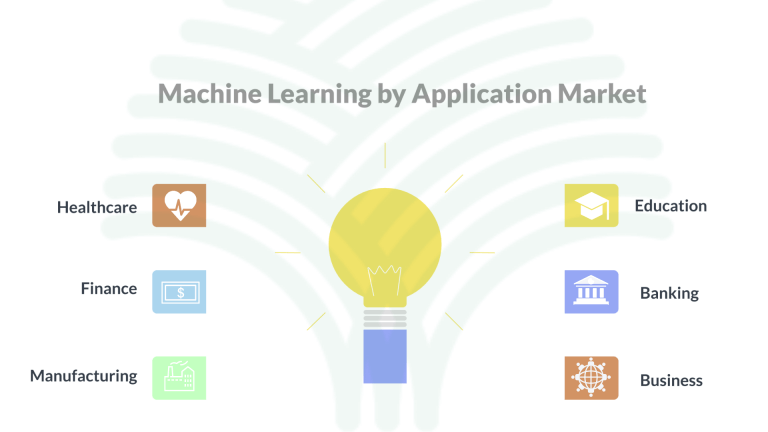
Here are 6 major industries where Machine Learning adoption is continuously on the rise.
Machine Learning in Healthcare
Machine Learning algorithms are providing world-class results in the healthcare industry. From electronic medical diagnosis to identify terminal diseases, Machine Learning in healthcare has come a long way.
Based on the patient’s past history, Machine Learning services in healthcare can make near-perfect predictions of the medical condition, suggest the best medicine based on parameters, and reduce risks by early identification of illnesses in the patient.
Machine Learning solutions facilitate faster patient recovery and provide the right recommendations for medical, fitness, and nutrition. It can be integrated with smart devices to get real-time updates on a patient’s health.
Machine Learning in Finance
Probably one of the most significant advantages of Machine Learning in Finance is the ability of algorithms to detect fraud and cyber threats. Based on a few parameters, Machine Learning programs can detect anomalies in the system and identify any online financial threats.
Algorithmic trading is increasingly gaining traction, allowing traders to execute orders based on pre-programmed parameters like price, quantity, and time.
Robo-advisors are one of the most common applications of Machine Learning in finance. They provide automated financial advice and guidance based on certain parameters.
Integrated with a portfolio management system, robo advisors can help in investment management to people who feel threatened by the complexities involved in managing their investment and portfolio.
Machine Learning in Manufacturing
T manufacturing industry is extensively utilizing Machine Learning solutions for predictive maintenance to reduce the costs of maintaining the equipment.
By coding Machine Learning algorithms and integrating with the manufacturing system, your organization can get alerts when it is time to schedule the maintenance for equipment.
Machine Learning understands the behaviour of the equipment, determines how much life is remaining and helps in improving the performance of the machine. It eliminates the unplanned downtime and sudden breakdowns that hinder the manufacturing process.
Another primary benefit of implementing Machine Learning algorithms is that it can process huge amounts of data and provide actionable insights for quality control. It helps in improving the product workflow.
Machine Learning in Education
Machine Learning programs are highly used for adaptive learning in education. The algorithm can analyze a student’s learning behaviour and modify the teaching methods & curriculum based on his or her capabilities.
Machine Learning in education enables teachers to manage their course content and curriculum in a better and more efficient way. Academic institutes can utilize Machine Learning solutions to schedule classes, manage students online, and get more time to focus on teaching.
One of the essential advantages of Machine Learning in education is personalized learning. Through algorithms, machines can identify the performance of every student and provide learning that is more personal. Students can choose their own subjects and set standards for learning.
Machine Learning in Banking
Machine Learning is used for improving the customer experience in a banking system. Banks have a large amount of user data, which, when analyzed properly, can provide real value to the bank for delivering a quality user experience.
One example is the chatbot Machine Learning service. Chatbots reduce the bank’s support staff workload as they can guide the customer in the right direction and answer common banking related queries.
A significant benefit of Machine Learning is that it helps banks in creating personalized offers based on what customers want at the moment.
Implementing Machine Learning algorithms will allow them to analyze customer searches. For example, if the customer looks at a car advertisement, the algorithms will automatically provide the best offer for a car loan to that customer.
Machine Learning in Business
Whether it’s an IT business, product-based business, or digital marketing company, Machine Learning programs have marked their presence across all spectrums of the business industry.
Probably one of the critical benefits of Machine Learning development in business is forecasting the demand for products. By analyzing the past purchase history and the ordering behaviour of customers, Machine Learning can identify when the demand for different products will increase.
Through Machine Learning in business, you can analyze the customer data and provide recommendations based on their purchases. Amazon and Netflix use Machine Learning solutions in their recommendation engine.
Businesses can also find a relation between their income and expenses through Machine Learning services. It enables them to identify the patterns in expenses over a period of time and provides actionable insights to make better decisions related to income and expenses.
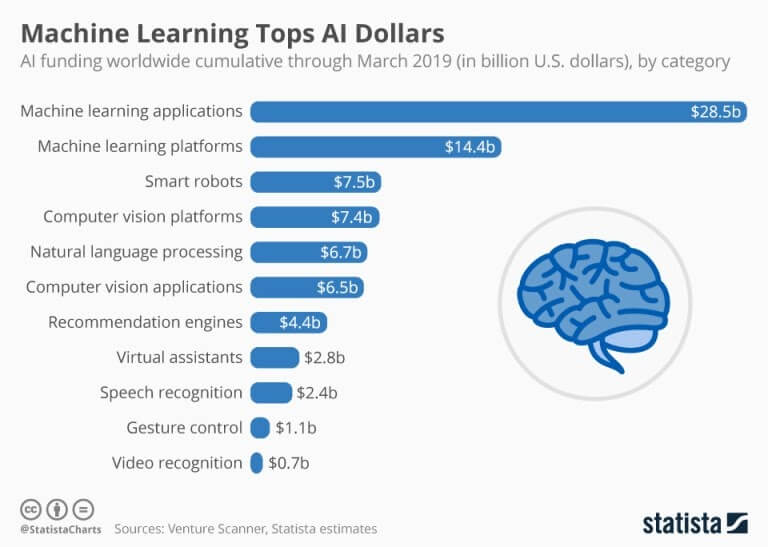
Conclusion: The future of Machine Learning
Experts predict that the AI services market will grow to $190 billion by 2025. It means that the demand for Machine Learning programs, which form the basis for AI, is going to multiply twofold.
IDC’s research shows that 75% of commercial enterprise apps will be AI-integrated by 2021. That is because AI and Machine Learning solutions provide nearly 50% more efficiency and 75% more accurate results based on data.
A major problem that Machine Learning services eliminate is the frequency of human error. Humans get tired, which may lead to low-quality of work, poor performance, and incorrect analytics.
Machine Learning algorithms work 24×7, and since it learns from the past iterations, machines deliver near accurate results in every industry.
On the other hand, Machine Learning development will require higher processing power in the future. It will lead to a rise in the demand for enhanced CPU systems and high-performing processors.
With the world moving towards cloud storage, Machine Learning systems will also welcome cloud deployment of machine apps for enabling businesses to access real-time insights whenever and wherever they want.
All-in-all, Machine Learning is going to transform enterprises, individuals, and the world as we know it today.




